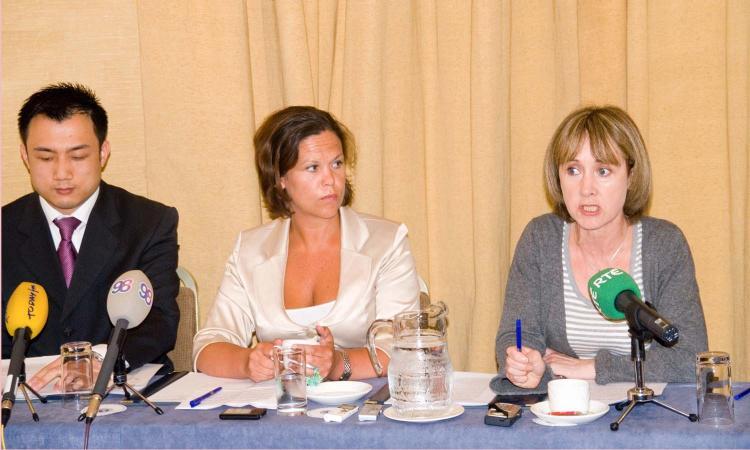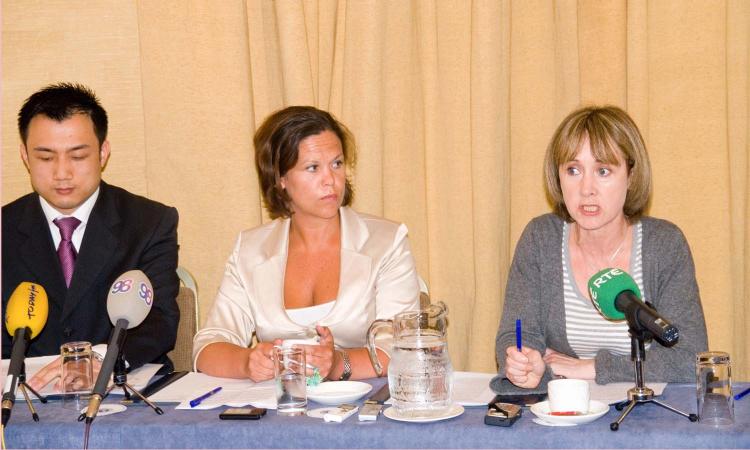On June 16, when Eutelsat took New Tang Dynasty Television off the air, the satellite company claimed that it was due to a power supply “anomaly” on its W5 satellite and that the source of the anomaly was being investigated. On July 11, Eutelsat issued a 97-word press release containing only one conclusion from its three-and-a-half-week investigation, “it will not be possible to recover operational use of the four transponders that were switched off as a result of the technical incident.”
However, according to incriminating new evidence contained in a recording of a conversation with a Eutelsat employee in Beijing on June 23, the anomaly became a pretext, there was never an investigation, and Eutelsat’s CEO in France, Giuliano Berretta, was the source of the power cut.
The highly sensitive recording was obtained by press freedom watchdog Reporters Without Borders (Reporters sans Frontieres – RSF) and released on July 10. The phone call was made by a Chinese interlocutor claiming to be a Director in the Central Propaganda Department calling a key official at Eutelsat’s Beijing office to check up on the status of the case.
In the transcript, translated from Chinese, the caller asked, “Are those few [transponders] really broken, or are we just using this technical excuse to stop them?”
The employee repeatedly responded that “the transponders are not broken” and goes on to explain that any of the satellite’s transponders could have been turned off and that it was a political decision to shut down NTDTV.
“We can choose to turn off this transponder, or another transponder. …But our CEO [Giuliano Berretta] issued the order to turn that one off,” said the employee. When the caller asked if it was because NTDTV was on that one, the answer was “Yes.”
The employee went on to say that Berretta turned off NTDTV because of “repeated complaints and reminders from the Chinese government.” He added that two years ago, the State Administration of Radio, Film and Television had “only had one sentence for us, ‘Turn it off before we can talk.’”
Pulling the plug on NTDTV was therefore Berretta’s “very friendly message” to the Chinese regime that Eutelsat wanted to talk, said the employee.
For several years Eutelsat has been vying to sign lucrative contract deals with China. In 2005, Berretta attempted to sacrifice NTDTV to win favor with Beijing by refusing to renew the TV station’s contract. That time, due in large part to an international outcry, the effort failed.
Carrying NTDTV had been so troublesome for Eutelsat, the Beijing official said laughing, that they’ve been “cursing it for several years,” hoping the W5 satellite would break down. The China office had even suggested that the Chinese regime simply shoot it down to put everyone at ease.
NTDTV was founded in 2001 and has been broadcasting via satellite, independent, uncensored Chinese-language programming into mainland China and across Asia since 2004. It has always been seen as an enemy by the Chinese Communist Party, because it reports truthfully on topics that the regime considers forbidden such as SARS, Taiwan, the persecution of Falun Gong, repression in Tibet, the underground Christian church and various other human rights and corruption issues.
“Actually, on the satellite, there should still be another transponder. A small part is still reserved… as a back up. In case any other is not functioning well, this is reserved.
“But this is very, very private information that cannot be announced to the outside. If the U.S. got the information, then our company cannot stand this kind of pressure. If people learned that you still have a spare one, that’s terrible,” he said, ironically adding, “Of course, if people get that information, it means that we have a mole in our company, ha ha [laughs].”
With the Beijing Olympics weeks away, NTDTV is anxious to get back on the air because it says that Chinese people need access to uncensored information.
“Mr. Berretta shut down NTDTV, slammed shut the only window of free information to millions of Chinese people,” said an NTDTV statement.
“Since the inception of the NTDTV broadcast on W5, it has become indispensable to a vast number of Chinese viewers,” the statement continued.
Since going off the air, NTDTV has received over 1,200 comments of support from viewers and signatures on its petition to Eutelsat to resume broadcasting.
Three viewers from Mainland China, Xiaoguan, Yong and Yushi Liu, wrote that “missing NTDTV is like having no fresh air to breathe. We suffocate when we see the fake news and reports from other TV stations.”
Another viewer, J. Zhuang said “there are too many people relying on the truthful reporting from NTDTV. Our hearts are burning! No matter what reasons, it is your utmost responsibility to resume the broadcasting.”
RSF said to ensure the safety of the interlocutor and the Eutelsat employee, their identities cannot be released.
Tala Dowlatshahi, U.S. Representative for RSF, said that her organization had taken rigorous steps to ensure the recording’s authenticity, had consulted with their lawyers, and were confident enough with the veracity of the materials to go public.
“Clearly as an organization that is representing scores of journalists we have to make sure that this is not just merely an allegation,” said Dowlatshahi.
Dowlatshahi said that RSF was in the process of trying to secure a variety of important documents regarding the case that the recorded employee had agreed to email to the supposed Propaganda Department Director during the course of the conversation.
Eutelsat could not be reached at its headquarters in Paris or its Washington office for comment.
However, according to incriminating new evidence contained in a recording of a conversation with a Eutelsat employee in Beijing on June 23, the anomaly became a pretext, there was never an investigation, and Eutelsat’s CEO in France, Giuliano Berretta, was the source of the power cut.
The highly sensitive recording was obtained by press freedom watchdog Reporters Without Borders (Reporters sans Frontieres – RSF) and released on July 10. The phone call was made by a Chinese interlocutor claiming to be a Director in the Central Propaganda Department calling a key official at Eutelsat’s Beijing office to check up on the status of the case.
In the transcript, translated from Chinese, the caller asked, “Are those few [transponders] really broken, or are we just using this technical excuse to stop them?”
The employee repeatedly responded that “the transponders are not broken” and goes on to explain that any of the satellite’s transponders could have been turned off and that it was a political decision to shut down NTDTV.
“We can choose to turn off this transponder, or another transponder. …But our CEO [Giuliano Berretta] issued the order to turn that one off,” said the employee. When the caller asked if it was because NTDTV was on that one, the answer was “Yes.”
The employee went on to say that Berretta turned off NTDTV because of “repeated complaints and reminders from the Chinese government.” He added that two years ago, the State Administration of Radio, Film and Television had “only had one sentence for us, ‘Turn it off before we can talk.’”
Pulling the plug on NTDTV was therefore Berretta’s “very friendly message” to the Chinese regime that Eutelsat wanted to talk, said the employee.
For several years Eutelsat has been vying to sign lucrative contract deals with China. In 2005, Berretta attempted to sacrifice NTDTV to win favor with Beijing by refusing to renew the TV station’s contract. That time, due in large part to an international outcry, the effort failed.
Carrying NTDTV had been so troublesome for Eutelsat, the Beijing official said laughing, that they’ve been “cursing it for several years,” hoping the W5 satellite would break down. The China office had even suggested that the Chinese regime simply shoot it down to put everyone at ease.
NTDTV was founded in 2001 and has been broadcasting via satellite, independent, uncensored Chinese-language programming into mainland China and across Asia since 2004. It has always been seen as an enemy by the Chinese Communist Party, because it reports truthfully on topics that the regime considers forbidden such as SARS, Taiwan, the persecution of Falun Gong, repression in Tibet, the underground Christian church and various other human rights and corruption issues.
Backup system kept secret
Another critical revelation contained in the recording is that the W5 satellite has a backup transponder in case there are technical problems with a principle transponder. The existence of this backup system was deliberately hidden, said the employee:“Actually, on the satellite, there should still be another transponder. A small part is still reserved… as a back up. In case any other is not functioning well, this is reserved.
“But this is very, very private information that cannot be announced to the outside. If the U.S. got the information, then our company cannot stand this kind of pressure. If people learned that you still have a spare one, that’s terrible,” he said, ironically adding, “Of course, if people get that information, it means that we have a mole in our company, ha ha [laughs].”
With the Beijing Olympics weeks away, NTDTV is anxious to get back on the air because it says that Chinese people need access to uncensored information.
“Mr. Berretta shut down NTDTV, slammed shut the only window of free information to millions of Chinese people,” said an NTDTV statement.
“Since the inception of the NTDTV broadcast on W5, it has become indispensable to a vast number of Chinese viewers,” the statement continued.
Since going off the air, NTDTV has received over 1,200 comments of support from viewers and signatures on its petition to Eutelsat to resume broadcasting.
Three viewers from Mainland China, Xiaoguan, Yong and Yushi Liu, wrote that “missing NTDTV is like having no fresh air to breathe. We suffocate when we see the fake news and reports from other TV stations.”
Another viewer, J. Zhuang said “there are too many people relying on the truthful reporting from NTDTV. Our hearts are burning! No matter what reasons, it is your utmost responsibility to resume the broadcasting.”
RSF said to ensure the safety of the interlocutor and the Eutelsat employee, their identities cannot be released.
Tala Dowlatshahi, U.S. Representative for RSF, said that her organization had taken rigorous steps to ensure the recording’s authenticity, had consulted with their lawyers, and were confident enough with the veracity of the materials to go public.
“Clearly as an organization that is representing scores of journalists we have to make sure that this is not just merely an allegation,” said Dowlatshahi.
Dowlatshahi said that RSF was in the process of trying to secure a variety of important documents regarding the case that the recorded employee had agreed to email to the supposed Propaganda Department Director during the course of the conversation.
Eutelsat could not be reached at its headquarters in Paris or its Washington office for comment.







